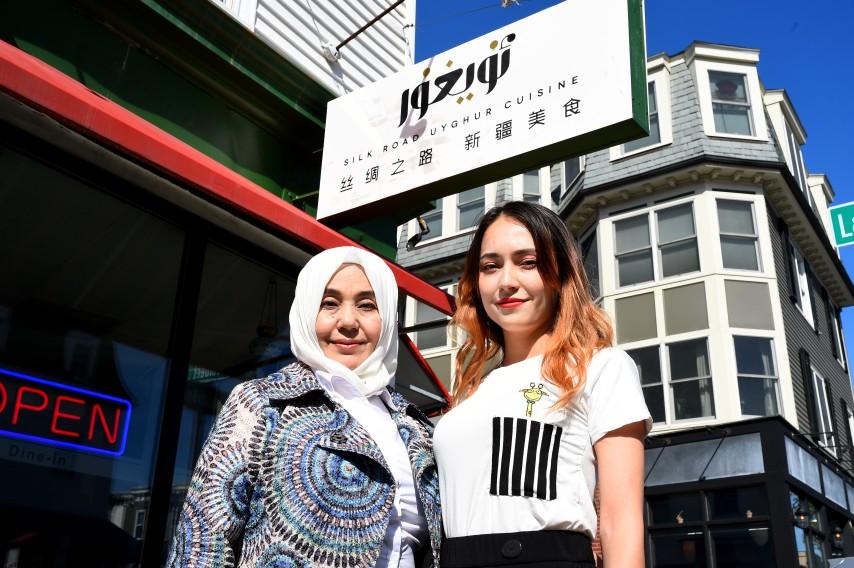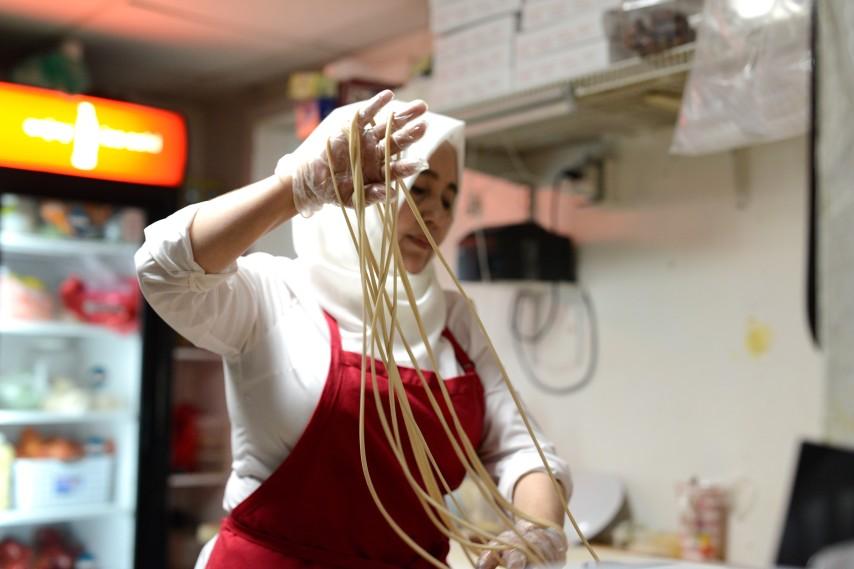Uighur restaurant owner speaks out: ‘I should fight for my father’
Adila Sadir, co-owner of Silk Road Restaurant in Cambridge, the only Uighur restaurant in Massachusetts, holds up a picture of her father, who is being held in a “political reeducation camp” back home in northwest China.
When27-year-old Adila Sadir first came to Boston at the age of 17, she planned to get a college education and go back home, where she would get married and start a family in Xinjiang, a region in northwestern China.
Ten years later, she’s still here.
Sadir is Uighur, a mostly Muslim ethnic group with a population of several million living in China that has historic ties to the Turkic peoples of Central Asia.
Related: China’s Uighur Muslim crackdown draws international concern
While Sadir was studying at the University of Massachusetts Boston, her father encouraged her to stay in America and focus on her studies. What Sadir didn’t know at the time was that conditions were progressively deteriorating for Uighurs in China. Under the pretense of a vast anti-terrorism campaign, the Chinese government was expanding laws restricting Uighur religious and cultural practices.
A 2018 report from the United States Congressional Executive Commission on China estimates that China is detaining as many as 1 million Uyghurs in “political reeducation camps.” In many of those camps, Uyghurs are cut off from their families, not allowed to speak their language or practice Islam. There are also reports of torture and brutal living conditions.
Related: How China’s detention camps for Uighurs are separating families
Sadir, who lives in Quincy with her mom, younger brother and sister, graduated from UMass with a degree in biology. In 2017, she opened Silk Road in Cambridge, the only Uighur restaurant in Massachusetts.
If customers ask Sadir about her family, she tells them about her father back in Xinjiang, who has been held in a detention camp since June.

For Sadir’s father and other family members, things are not good. The last time she heard from her father was in November.
“I worry about my father so much. There’s no way I can help him,” she said. “Just because he’s Muslim, he’s Uighur, he got into the camp.”
After her father was detained last June, Sadir kept quiet and hoped the Chinese authorities would let her father go.
“I didn’t speak out,” she said. “I would just wait and hope my father would get out in one month or two months.”
In December, Sadir stopped waiting and went very public. She started posting on Facebook in Chinese, a language she speaks and writes well. She posts with the hashtag #metooUyghur.
When Sadir comes to work at Silk Road, though, she leaves her politics outside.
“Not many people know about Uighur in this area,” she said. “We want to present our culture and our cuisine here.”
Sadir estimates around 60 percent of her clientele are Chinese, mostly local students. Inside the restaurant, there’s no conversation about what Uighur people are going through in China. Sadir said she doesn’t blame her Chinese customers for the government’s actions, but she believes many of them get their information from Chinese state media and wouldn’t believe her if she told them.
Although popular with Chinese customers, Uighur cuisine and culture are closer to Central Asian. The high points of Silk Road’s menu are hand-pulled noodles, rice pilaf, lamb soup, and homemade yogurt with raisins and honey.
Sadir estimates there are around 150 Uighurs living in the Boston area. Silk Road is a place they can come to get a taste of home.
When the restaurant first opened, many local Cambridge residents who came in didn’t know much about Uighurs, Sadir said.
“I had a couple customers, they just stopped by and ask my family situation,” said Sadir. “They say kind things. They stop by just to support us.”
Every Uighur working at Silk Road has their own personal stories about aunts, uncles, parents, in-laws and other family members who are detained.
Silk Road’s head chef, who asked not to be named, movedto Boston from Turkey last year. He said he knows around 20 people who are currently detained. He has a scar across his nose that he said came from being beaten by a guard while he himself was detained in Xinjiang for two months in 2016. He said he was able to leave the camp after a lengthy appeals process and fled the country shortly afterward.
One of the only non-Uighurs in Silk Road’s kitchen is 27-year-old Jackie Lim, Sadir’s best friend. Lim, who is Chinese American, grew up in Quincy and spent years working in local restaurants. Since he became friends with Sadir, he also posts online with #metooUyghur.
“Before I worked here, I never heard of ‘Uighur,’” he said. “But then after I worked here, they became my family and everything.”

Sadir’s mother, Maria Mohammad, also works in the kitchen. Sadir said her mom is the cooking expert of the family. Mohammad taught Lim the art of making hand-pulled noodles, the restaurant’s specialty.
Sadir has lived in the Boston area for almost 10 years, but she still refers to Xinjang as home, though it’s a place she may never be able to visit again.
Related: US Uighurs split on how to help their family in China
“It’s not the place I grow up anymore. Everything’s changed,” said Sadir. “People are living under fear. No one trusts each other.”
She wants more people to know what’s happening in Xinjiang.
“My father worked for me his entire life, and now he’s missing,” Sadir said. “He might be dying. If I don’t do anything, I will feel regret. I should fight for my father.”
Sadir said she knows that speaking to a reporter could put her in danger, but she said she’s done being quiet.
This article was originally published by WGBH. Read the original here.
